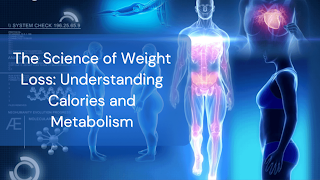The Science of Weight Loss: Understanding Calories and Metabolism
Weight loss is often simplified as "eat less, move more," but the science behind it is more complex. Understanding how calories and metabolism work is crucial for making informed decisions on your weight loss journey. This article breaks down these concepts to help you better understand how your body uses energy and burns fat.
What Are Calories?
Calories are units of energy found in food and drinks. Your body uses these calories to perform essential functions like breathing, circulating blood, and physical activity. When you consume more calories than your body needs, the excess is stored as fat.
The Role of Metabolism
Metabolism refers to the chemical processes your body uses to convert calories into energy. It includes:
- Basal Metabolic Rate (BMR): The energy your body needs to function at rest. It accounts for 60-70% of the calories you burn daily.
- Physical Activity: Any movement you do, from walking to exercising, burns calories.
- Thermic Effect of Food (TEF): The energy your body uses to digest, absorb, and process food, which accounts for about 10% of your calorie burn.
Calories In vs. Calories Out
Weight loss occurs when you burn more calories than you consume, creating a calorie deficit. For example, burning 500 calories more than you eat daily can result in losing about 1 pound per week.
Factors That Affect Metabolism
- Age: Metabolism slows as you age.
- Gender: Men typically have a higher metabolic rate due to more muscle mass.
- Muscle Mass: Muscle burns more calories at rest than fat.
- Hormones: Hormonal imbalances can impact how your body uses energy.
- Genetics: Your genetic makeup influences your metabolic rate.
Tips to Optimize Metabolism for Weight Loss
- Build Muscle: Strength training increases muscle mass, which boosts your resting metabolism.
- Stay Active: Regular physical activity helps burn calories and keeps your metabolism active.
- Eat Enough Protein: Protein-rich foods require more energy to digest and help preserve muscle during weight loss.
- Stay Hydrated: Drinking water can temporarily boost metabolism and help your body function efficiently.
- Get Enough Sleep: Poor sleep can disrupt hormones that regulate appetite and metabolism.
Understanding Weight Loss Plateaus
Plateaus happen when your weight stops decreasing despite following your plan. This occurs because your metabolism adjusts to your lower calorie intake. To overcome plateaus:
- Reassess your calorie needs.
- Incorporate more activity.
- Try alternating calorie levels to keep your metabolism guessing.
The Importance of Sustainable Practices
Drastic calorie cuts or extreme diets can slow your metabolism, making it harder to lose weight in the long term. Instead, focus on gradual changes that you can maintain, such as balanced eating and consistent exercise.
Final Thoughts
Weight loss isn’t just about counting calories; it’s about understanding how your body works and creating a sustainable approach. By focusing on the science of calories and metabolism, you can make informed decisions that lead to long-term success.
This comprehensive guide will resonate with your readers, empowering them to take control of their weight loss journey through knowledge and sustainable strategies!





0 Comments